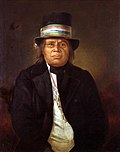Wikipedia:Today's featured article/requests/Menominee Tribe v. United States
Menominee Tribe v. United States
[edit]- This is the archived discussion of the TFAR nomination for the article below. Subsequent comments should be made on the appropriate discussion page (such as Wikipedia talk:Today's featured article/requests). Please do not modify this page.
The result was: scheduled for Wikipedia:Today's featured article/May 27, 2015 by Brianboulton (talk) 21:26, 10 May 2015 (UTC)
Menominee Tribe v. United States, 391 U.S. 404 (1968), was a case in which the Supreme Court ruled that the Menominee Indian Tribe kept their historical hunting and fishing rights even after the federal government ceased to recognize the tribe. It was a landmark decision in Native American case law. The tribe had entered into treaties with the United States which did not specifically state that they retained hunting and fishing rights. In 1961, Congress terminated the tribe's federal recognition, and two years later in 1963, three members of the tribe were charged with violating Wisconsin's hunting laws on former reservation land. The Indians were acquitted, but when the state appealed, the Wisconsin Supreme Court held that the tribe no longer had hunting and fishing rights due to the termination action. The tribe sued the United States in the U.S. Court of Claims, which ruled that tribal members still had hunting and fishing rights. The opposite rulings by the state and federal courts brought the issue to the Supreme Court. In 1968, the Supreme Court held that the tribe retained its hunting and fishing rights. (Full article...)
- Most recent similar article(s): No recent article since at least Nov. 1, 2014
- Main editors: GregJackP
- Promoted: Nov. 3, 2013
- Reasons for nomination: This is an interesting article on Native American treaty rights. There have been no recent articles on this subject that I could locate.
- Support as nominator. GregJackP Boomer! 17:17, 18 April 2015 (UTC)
- Support:Underrepresented topic, precedent-setting legal case. Montanabw(talk) 02:37, 19 April 2015 (UTC)
- Support, agree with Montanabw, --Gerda Arendt (talk) 12:30, 25 April 2015 (UTC)
- Note: This will be scheduled before the end of May. Brianboulton (talk) 17:33, 1 May 2015 (UTC)

